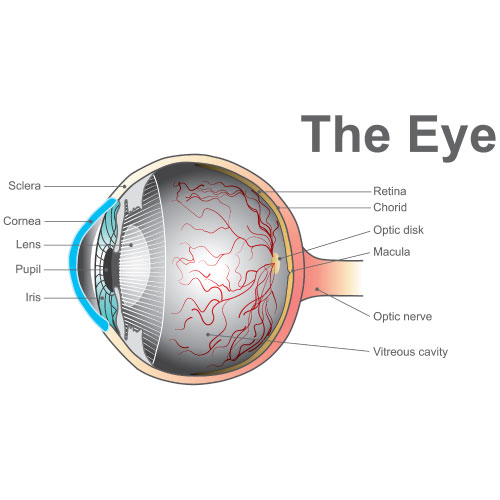
Health You Can See: 10 Best Eye Supplements for Vision
May 1, 2023
From early morning to late night your eyes allow you to enjoy a rainbow of colors and a vast array of shapes. Most of us take these sophisticated visual instruments for granted until they begin to deteriorate.
Millions of people suffer visual issues due to age or health. In fact, vision is one of the top reasons that elderly lose their independence. But protecting vision isn’t just for mature individuals. As we spend more and more time staring at digital devices and our eyes are exposed to harmful blue rays, vision issues are happening at an early age. The time to protect your eyes is now.
In This Healthy Insight:
- How Does The Eye Work?
- Causes of Bad Eyesight and Vision Issues
- Traditional Herbs for Eyesight
- Vitamins for Vision
- Supplements for Vision
- Tips for Maintaining Healthy Eyes and Strong Vision
How Does The Eye Work?
Eighty percent of our experiences comes through our vision with each part of the eye playing a key role.
First, light passes through the cornea and enters into the pupil. The light then passes through the lens to ensure the focus is correct, then onto the retina at the back of the eye. The retina contains special photoreceptors, including the macula, that convert the light into electrical signals that move through the optic nerve and into the brain for processing. Your brain uses information from the optic nerves of each eye to allow you to see a single image.

Causes of Bad Eyesight and Vision Issues
- Overexposure to blue light (computer vision syndrome)
- Dry, itchy eyes
- Eyestrain
- Difficulty driving at night
- Blurriness
- Tired eyes
- Poor ability to focus
- Dealing with eye wear
- Difficulty reading
- Neck, shoulder and head pain
Traditional Herbs for Eyesight
- Eyebright
- Ginkgo Biloba
- Bilberry
Eyebright and Eyesight
Herbalists have used eyebright for centuries to ease eye irritations. This traditional antioxidant herb is thought to help strengthen and boost circulation. It also contains trace amounts of Vitamins A and C.
Ginkgo Biloba and Eyesight
While you might think of ginkgo biloba as a memory herb, it actually can help boost blood circulation throughout the body including the optic nerve and eye tissue.

Bilberry and Eyesight
For centuries the fruit of bilberry, a small shrub native to Europe, Britain and Siberia, has been prized for its health benefits. Bilberry was first taken for vision by British Royal Air Force pilots in WWII so they could see better on their nighttime bombing runs. Today bilberry is known to provide antioxidant support to protect against free radicals, enhance blood supply to your eyes and maintain the integrity of the capillaries that nourish your eyes.
Vitamins for Vision:
Vitamin A (beta-carotene, lutein) and Vision
Vitamin A is obtained from colorful fruits and vegetables including carrots, sweet potatoes, spinach and cantaloupe and is considered a carotenoid, most significantly beta-carotene. It is vital for your eyes because it helps maintain the integrity of the membranes around your eyes and keeps your corneas moistened and lubricated. It also acts as a protective barrier against environmental issues. Vitamin A is important for growth, immune system and good vision.

Beta-carotene is converted in the body to Vitamin A
Related to Vitamin A, lutein is a carotenoid found in many yellow and orange pigmented fruits and vegetables like corn, carrots, mangoes and dark, leafy greens such as spinach, kale and broccoli. Many studies have shown that when we ingest lutein it is deposited in the tissues of your eyes, including the retina, macula and lens.
Lutein acts as an antioxidant in the body, helping to protect and maintain healthy cells. Since our bodies do not make lutein, the only way to obtain it is through the foods we eat, fortified foods, or nutritional supplements.
Vitamin E and Vision
The main role of Vitamin E is as an antioxidant to help neutralize harmful free radicals, including those due to environmental factors like cigarette smoke. Vitamin E can offer protection from these unstable molecules. The eye, in particular, is more susceptible to oxidative stress, making Vitamin E important for maintaining healthy vision.

Vitamin C and Vision
Vitamin C appears to be vital to maintain healthy eye pressure, capillary integrity and collagen. The eyes are particularly sensitive to free radical damage and the antioxidant properties of Vitamin C can help protect them.
Supplements for Vision
- Lutein
- Zeaxanthin
- Taurine
- Alpha Lipoic Acid
Lutein
Absorbable and increases density of macula pigment.
Zeaxanthin
Shields the macula where greatest protection is needed.
Taurine
Amino acid that plays a role in overall health and vision.
Alpha Lipoic Acid
Universal antioxidant that protects from free radicals.

Tips for Maintaining Healthy Eyes and Strong Vision
- Get regular eye exams
- Blink frequently, especially while staring at screens
- When using a digital device, rest your eyes every 20 minutes for 20 seconds
- Use proper lighting
- Wear sunglasses with 100% UV protection
- Eat plenty of fruits and vegetables
- Stop smoking
- Control blood pressure and cholesterol
- Maintain a healthy weight
- Get regular exercise
- Use safety eyewear
- Wash your hands before touching your eyes
While it’s probably impractical to take all of the vitamins and herbs mentioned above, you might select a vision supplement with a mixture of these. Whatever you take, make sure it’s high quality or you’ll be wasting your time and money.
You have only one set of eyes and they deserve the best care. Protect them today for good vision that lasts a lifetime.
These statements have not been evaluated by the Food & Drug Administration. These products are not intended to diagnose, treat, cure or prevent any disease. Individual results may vary.



